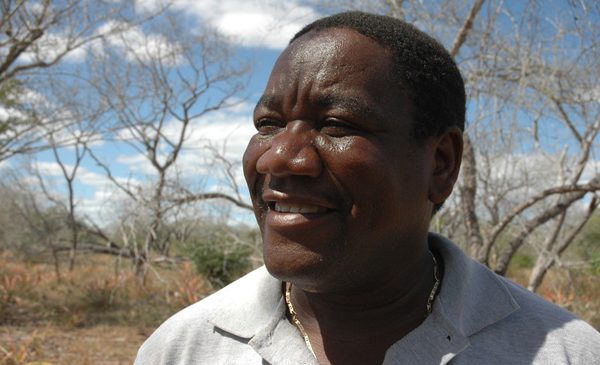
In the latest of our ongoing series of blog posts from Mozambique, we introduce you to another inspiring person we’re working with to help stop hunger in the drought-stricken country.
Justino Simon is a project coordinator with one of our partner organisations, the Christian Council of Mozambique Inhambane. Oxfam News editor Maureen Bathgate travelled to Mozambique to learn more about how Justino is helping communities in Inhambane province increase crop yields, improve nutrition and work toward a brighter future.
Justino’s story
When did the project start?
Justino: The situation here is changing, because of a lack of rain. I started implementing this project in 2006 by myself. Now I have a colleague and he will help me to implement the project. Please tell the donors in Australia that the community here in Cupo are very happy with the support from Australia.
Thank you, I will. It’s good to see some vegetables that are growing well. We’ve seen many, many vegetables that don’t grow because there is not enough water.
It’s also been really good to see some of the techniques you are implementing to improve soil fertility, like the ditches, the fertiliser and the raised beds.
Justino: And we also use chicken manure and cow manure to fertilise the soil.
And even in the project team we have improved because of the support and assistance we receive from Oxfam. This has helped us to grow, in terms of activities. It is important that Oxfam monitors and advises use, so we can keep improving.
What is the biggest problem families face here in Cupo?
Justino: Lack of water and rainfall is a big problem. We had another project that constructed the boreholes — weapons were exchanged for boreholes. Several families in this area were affected by the [civil] war. Even though the war has finished, the families still have the weapons — guns. So we have introduced a program where people can hand in their weapons. The project collects the guns and the people get a borehole in return. Yesterday I collected two guns. That is the way to promote peace here.
[Later, Justino shows me a sculpture of a farmer ploughing a field with a donkey, that has been made entirely from disabled weapons that have been handed into the project by local community members. It stands in the heart of the community as a symbol of peace. –MB]
How far do you have to dig to reach water, here?
Justino: It depends on the area, but usually we put the borehole near to the wetlands. And in these places you can find water from five or six metres. In other areas, if we are using a hand pump, to pump the water, then we can use this system from 70–80 metres.
What has been the difference, in terms of harvests, since before the project started and now?
Justino: Before, the harvest was so low, but now there is an increase. Before, people didn’t grow potatoes here and people weren’t in the habit of eating them. But since we have introduced them, people now eat them.
Also, before, people weren’t able to grow vegetables or rice. But now we have introduced all these crops into the community and shown people how to grow them. Now people have started to eat these staple foods on a regular basis. And they really have increased diversity of the food they grow and eat, and as a result the health and nutrition of the community has improved.
And another thing that’s very important is that before, the people weren’t able to send their children to school … Since the project started in the community we have encouraged people to send their children to school. Also, families get money from selling their vegetables and are able to pay for school fees, books and uniforms.
Can you please outline some of the main problems that farmers face in the area in terms of growing food?
Justino: The first problem that farmers face is the lack of rain. Another problem is a market to sell their produce.
What are some of the projects that CCM has introduced to address these issues?
Justino: We have introduced agriculture conservation to improve soil fertility and moisture retention. We also train the farmers in basic techniques to conserve water with their crops, and we use organic fertilisers and compost and pesticides. We are also going to operate demonstration plots where the farmers will come in and learn about how to deal with these problems. We will open two demonstrate plots in Cupo and two in Tlavane.
What are some of the changes you have seen in terms of harvests since CCM started the project in this area?
Justino: Before, the people here did not select the seeds, they just only used the grains they harvested. We trained the community in seed selection, because without good quality seeds, they will not have a good harvest.
Now, because people use the selected seeds, the harvest has tended to improve. We also talk about soil conservation. We trained the community to rotate their crops with different varieties because if you use the same types of seeds for many years, the soil will become poor. If you do rotation, the soil fertility will improve and yields will tend to improve. If you add the seed selection, with the humidity conservation, we believe that the harvest will be increased. Also, the vegetable production has increased on previous years.
Our challenge now is to build the community’s skills in food processing, so that the food they harvest lasts longer. Some people wanted to be trained in the processing of food, and we believe that these people will train people in other communities.
Next week: Meet Rosa and Marta, who are getting the most out of their harvests with the food processing techniques they’re learning.
(Want to help make a difference? Donate to our Stop Hunger appeal and support our work with poor communities in Mozambique.)